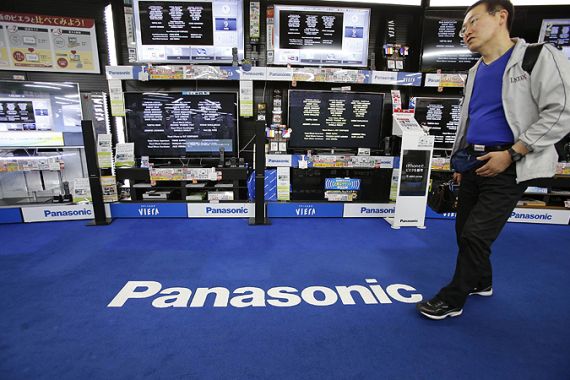Panasonic forecasts profit despite big loss
Japanese electronics giant reports near-record net loss for fiscal year but foresees operating profit rising 55 percent.

Panasonic Corp, the Japanese consumer electronics company, has reported a near-record net loss of 754bn yen ($7.5 bn) for the fiscal year through March due to restructuring costs and falling sales.
Nevertheless, it has predicted a return to profitability this year as it cuts unprofitable businesses.
Panasonic forecast on Friday that its operating profit would rise 55 percent in the year to March 31 as it shifts focus from struggling operations in TVs and other consumer gadgets.
The company expects operating profit to rise to $2.52bn (250bn yen) in the current business year from last year’s $1.58bn.
That compares with an average $2.37bn forecast from 18 analysts surveyed by Thomson Reuters I/B/E/S before the company released its latest earnings figures on Friday.
Panasonic’s CEO, Kazuhiko Tsuga, has promised to sell off within two years any loss-making or low-profitability units that fall short of a five percent annual operating-margin threshold.
Further restructuring, however, could add to costs and squeeze its bottom line.
New strategy
Panasonic’s strategy to pull away from consumer electronics contrasts with domestic rival Sony Corp, which is bettting big on mobile phones, cameras and game consoles in a bid to revive the fortunes of its core consumer electronics business, which still accounts for more than half of revenue.
At Tsuga’s company, TVs, DVD players and other home entertainment gadgets represent less than one-fifth of sales, leaving it more options to pursue profits elsewhere.
Panasonic’s biggest earning segments are appliances, such as washing machines and refrigerators, and the division it dubs “eco solutions”, which makes light fixtures, toilets, ceiling fans and other household fittings that hark back to the company’s beginnings in 1908 making electrical extension sockets.
In October, Tsuga bit the bullet on non-performing, usinesses by writing down billions of yen in tax-deferred assets and goodwill related to its businesses making mobile phones, solar panels and small lithium batteries.
The result was a net loss of $7.43bn last business year, nearly matching the prior year’s record $7.61bn loss.
Like Sony, however, the company is relying on asset sales to underpin its finances as it tries to revive profit growth, pledging to keep annual free cashflow above $1.97bn.
Asset disposals
Panasonic’s disposals have included a Tokyo office building and $1bn worth of stocks in companies such as Toyota Motor Corp.
The value of its assets fell to $53.25bn at the end of the latest business year from $65bn a year
earlier, as a result of asset disposals and writeoffs.
Over the next two years, Panasonic, which has seen its sales shrink by one-fifth from a peak of $92bn six years ago,
plans to spend $2.5bn to revamp its businesses.
It has yet to announce additional staff cuts, after shedding 40,000 jobs over the past two years.
With 300,000 workers it remains one of Japan’s biggest employers.
Since the start of the year, the company’s shares have gained 43 percent, keeping pace with a 40 percent rally in the benchmark Nikkei average as weakness in the yen boosted the outlook for exporters.
Panasonic’s shares rose 3.7 percent on Friday to close at $7.38 (749 yen) before it released its latest earnings figures.